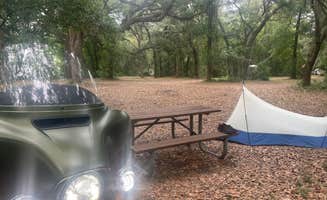Dispersed camping opportunities near Bowling Green, Florida center around inland waterways and conservation lands managed by the Southwest Florida Water Management District. The subtropical climate creates year-round camping conditions with hot, humid summers and mild winters. Free camping in this region typically requires self-reliance with minimal facilities and focuses on experiencing natural Florida ecosystems including palmetto prairies, riverine forests, and freshwater marshlands.
What to do
Paddling exploration: Peace River Banks Backcountry offers backcountry camping accessible primarily by water craft. "The Peace River runs north to south. More camping down to Arcadia. Canoeing and kayaking are preferred mode of transportation but I've seen others use Jon boats and airboats," notes camper Bob S.
Wildlife observation: The conservation areas around Bowling Green provide habitat for native Florida wildlife. Early mornings and evenings offer the best viewing opportunities for deer, wild turkey, and various wading birds common to Florida's inland wetland systems.
Stargazing: The rural setting and minimal light pollution create excellent conditions for night sky viewing. The absence of developed facilities means minimal artificial lighting, allowing for clear views of constellations and occasional meteor showers.
What campers like
Natural solitude: Upper Hillsborough Water Management Area offers a quiet retreat. "We were the only ones there for the weekend, probably because of the summer heat. However, it was nice and free," reports SukiDookie, highlighting the peaceful atmosphere that attracts visitors seeking seclusion.
Budget-friendly camping: Free camping near Bowling Green, Florida appeals to cost-conscious outdoor enthusiasts. The no-fee policy at conservation areas makes these locations accessible options for extended stays without campground expenses.
Accessibility to towns: Despite the rustic setting, campers appreciate the proximity to nearby communities. The ability to access services while enjoying primitive camping creates a practical balance for longer stays.
What you should know
Limited facilities: While Upper Hillsborough offers some basic amenities, campers should prepare for truly primitive conditions. "There is a porta-potty, but I didn't check it out, so I'm not sure about the cleanliness. The grounds were nicely maintained, though. I do wish the fire rings weren't so damaged, and the lack of trash cans was surprising," SukiDookie notes about their experience.
Weather considerations: Florida's subtropical climate means high humidity and afternoon thunderstorms during summer months. Winter camping offers milder temperatures but occasional cold fronts can bring temperatures into the 40s overnight.
Navigation challenges: First-time visitors may find locating designated camping areas difficult. "Didn't find the Main Camping area. Parked in one of the side roads. Didn't run into anyone eventhough permit page indicated Booked out," shares Nina O., indicating the importance of having detailed maps or GPS coordinates.
Tips for camping with families
Pack water supplies: With no potable water available at primitive sites, families should bring 1-2 gallons per person per day, with additional water for cooking and cleaning.
Bug protection: Florida's inland areas can have significant insect activity, particularly during warmer months. Screens, repellents, and protective clothing are essential for comfortable camping with children.
Shade considerations: Summer temperatures regularly exceed 90°F with high humidity. When camping with children in these conditions, select sites with natural shade coverage and bring additional sun protection.
Tips from RVers
Size limitations: The primitive nature of camping areas near Bowling Green means limited accommodation for larger rigs. "Large open area with great shade trees, no water, privy. Easy pull through for RV. Tent spots. Fire rings," describes Scott O. about Upper Hillsborough, but access roads may be unpaved and narrow at some locations.
Self-contained requirements: With no hookups or dump stations available, RVs must be fully self-contained with sufficient tank capacity for the intended stay duration.
Ground conditions: Seasonal rainfall affects ground firmness, particularly during Florida's rainy season from June through September. RVers should check recent conditions and weather forecasts before attempting access during potentially wet periods.


